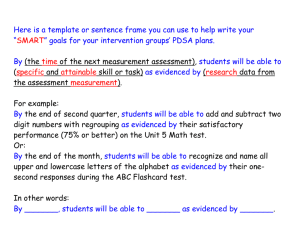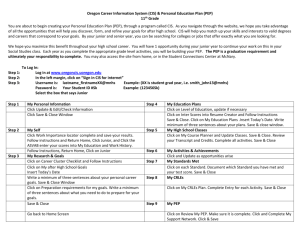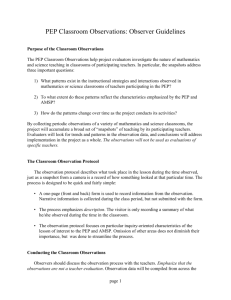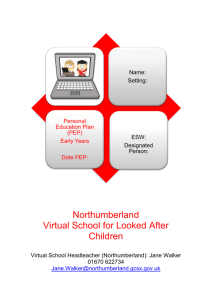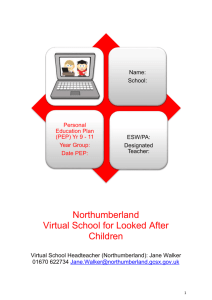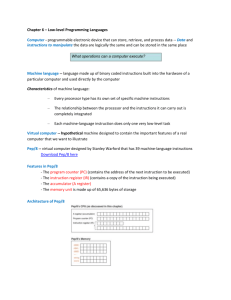Tana Forrest - Introduction to Professional Experience Portfolio
advertisement
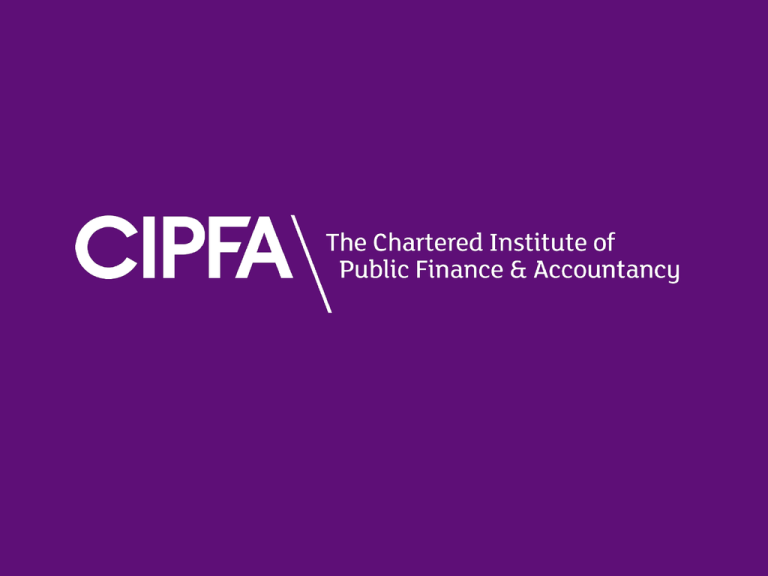
Introduction to PEP (Professional Experience Portfolio) Tana Forrest Student Recruitment Manager PEP requirements (3 in total) 1) Log a minimum of 400 days of workplace experience 2) Evidenced activities (3 in total, 1 activity must include an oral presentation) 3) Overall Learning and Development documents: General reflection and future learning goals CPD Learning and Development Plan Only submit once you have passed your final exams 1. PEP: Work Experience Demonstrate 400 days 200 days for AAT members (Appendix 1) (up to 10 years prior to submission) (up to 10 years prior to submission) 8 competency areas (Appendix 1 on pages 26-28): Leadership and Strategic Management Strategic and Operational Financial Management Financial and Performance Reporting Governance, Ethics & Values Audit and Accountability Partnerships and Stakeholder Relations Change, Risk and Project Management Procurement and Contract Management Tasks can be allocated to several areas but not double-counted Employers required to verify experience Pages 7-9 1. Work experience summary sheet PEP 400 day work log Candidate's name: Student number: Employing organisation: Summary Statement of Expertise area Leadership and Strategic Management Strategic and Operational Financial Management Financial and Performance Reporting Governance, Ethics and Values Audit and Accountability Partnerships and Stakeholder Relations Change, Risk and Project Management Procurement and Contract Management TOTAL Total number of days in this area Employer’s initials PEP Workplace Experience Detailed log Dates Description of workplace experience Statement of Expertise area What has been learned and how may it be used? Outcome of learning and future application Number of days Jan 13– Feb 13 Compilation of a contracts & tenders register for Environment & Leisure Procurement & Contract Management This has given me an understanding of how the tendering process works, and the rules and procedures have been followed. I will use this in the future to portray openness and transparency in order to prevent accusations of fraud. 25 June 13 – Sept 13 Payment of invoices Strategic & Operational Financial Management I learnt how to follow through the entire payments process order of receiving a goods receipt note, to finally make a payment. This enhanced my understanding of how the procurement process works. 20 Employer’s Signature Employer’s initials 2. PEP: Evidenced Activities (Appendix 1) 3 Professional Level activities (No more than one per SOE area – Appendix 1 on pages 26-28) 1 of the 3 activities to include an oral presentation in the planning and execution of the activity Students required to write about each activity: Include: Cover Sheet Employer Validation form Sections (for each activity): Planning and Execution Evidence Ethical Considerations Learning PEP Evidenced Activity Cover Sheet Candidates full name: Manager’s full name: Manager’s job title: Employing organisation: Title of evidenced activity: Statement of Expertise Area: Date activity completed: Role played by candidate in that activity: As the candidate I confirm that I have: fully explained how I planned this activity identified the role I played in this activity explained how the task was carried out included relevant evidence (2-4 pieces) that proves: that the activity happened what my role was what the outcome was reflected fully on my experiences undertaking this activity identified and listed my learning points, needs or goals that I have identified as a result of undertaking this activity PEP Evidenced Activity Employer’s Validation Report Nature of activity: Acting as a Supervisor Role of the candidate in the activity: Supervising two trainees in producing a briefing note on explanatory forewords Outcome of activity: The student produced the briefing note on time having supervised the trainees in the completion of the activity. Report on the completion of the activity: Developing the explanatory foreword to the statement of accounts was an important objective in seeking to improve financial reporting. The project also presented a good opportunity for our student to practice her supervisory skills. The student researched the subject well and produced a good report within the agreed deadline. Our student handled the supervisory aspects of the task well, and I am pleased that they have learnt from the experience. Manager's signature Date Candidate's signature Date Evidenced Activities: Planning and execution (400-600 words) Why you decided to choose this activity Identify the criteria you used in making the decision How you went about planning the activity and how you took into account the type of evidence you would need for your portfolio Did you discuss choice of activity with anyone? What were the main objectives of the activity? Timescales and resources needed for the activity? Any barriers or risks to success of the activity? Pages 10-11 Evidenced Activities: Evidence Each activity must provide 2-3 items of evidence, one of which should be the employer’s validation report For the oral presentation, maximum of 4 pieces of evidence including employer validation report Examples: written reports, emails (validated), meeting agenda/minutes, appraisal forms, feedback forms, PowerPoint slides Appendix Evidence 2.2a – my role Agenda – for the meeting which includes my presentation s as the first item. 2.2b – 2.2c – it happened, outcome Feedback from all the attendees Page number 52 53-55 Pages 11-12 Evidenced Activity : Ethical Considerations (400-600 words) Importance of ethics should not be underestimated Principles contained in the SOPP (Standard of Professional Practice on Ethics) must be followed ‘Ethics and You’, another useful document (includes case studies) Relate to the five principles of – ‘integrity’, ‘objectivity’, ‘professional competence and due care’, ‘confidentiality’ and ‘professional behaviour’ Also relate values like – ‘professional scepticism’ and ‘professional judgement’ and attitudes like ‘commitment to the public interest’ Pages 12-14 Evidenced Activity : Ethical Considerations (continued) Consider – approaches that could be taken to complete the task, way in which the activity is completed and general behaviour of individuals What ethical principles, professional values or attitudes applied in the activity What threats and safeguards were implemented? How you behaved ethically in relation to the activity How you could behave more ethically or professionally in the future Encourages good habits and best practice Pages 12-14 Evidenced Activity: Learning (300-500 words) Reflect on how well you applied knowledge and skills to the activity How it might influence future work and performance Whether you have learned something new? How the learning took place? How it related to previous knowledge? How you will apply the learning in the future and your professional development? Whether the reflection has helped identify other learning and development needs? Can be followed through to the General Reflection and Learning section Page 14 and Appendix 2 Evidenced Activity: Oral Presentation (300-500 words) Only required as part of one of the evidenced activities Present in a reasonable formal work setting An audience of at least 3 people Maximum of 4 pieces of evidence including employer validation report Must include 1 or 2 pieces of evidence specifically relating to the presentation; in addition to (for example) – slides, speaker notes or summary of feedback forms Evidence should confirm your role in the presentation Pages 14-16 and Appendix 3 (pages 32-34) 3. Overall Learning and Development: General Reflection and Future Learning Goals (1000-1500 words) Reflect on your learning over the training period, covering the whole PEP experience Should be completed after work experience log and three evidenced activities How did the CIPFA theory influence you in practice? How you related learning to work experience? Positive and negative factors throughout the period What you learned about application of professional values, ethics and attitudes to practical activities in the workplace? Which activity had greatest effect on professional practice Pages 16-17 and Appendix 2 Overall Learning and Development: General Reflection and Future Learning Goals Identify future learning goals, both long and short term ‘Learning’ section of activities should identify these Prioritise the future goals and set deadlines Identify goals to be met in first year of CPD Explain why each goal is important to your development Important to link PEP to CPD Template page 17 Summary of future learning goals Development Needs (Learning Goals) CPD Activities (Action to be taken to meet goal) Maintain an understanding of the issues affecting the public sector Develop my technical skills in Excel, Word, PowerPoint, and in SAP Time Frame Evidence that goal has been achieved Reading public finance regularly Attending update courses on current events (at least 2 per year) By 30 June 20XX Contribution to strategic planning Certificates of attendance Attending training courses Practising and exploring software By 01 Nov 20XX Certificates of attendance Feedback from managers on my performance and effectiveness CPD Action Plan Learning and Development Plan (Level 2) Name: Membership Number: 12345678 CPD Year: 2013 Key Roles and Responsibilities Development Needs CPD Activities Managing budget process for Service A Project management skills – planning, documenting and monitoring project progress. Attend a Prince2 course. PEP Submission and Review 3 copies – 2 for CIPFA and 1 for yourself Include the PEP submission form (on website) Purchase PEP submission via online CIPFA Shop Spiral or comb-bound documents Send copies secure, recorded delivery to the CIPFA Student Support team at CETC London No set submission deadlines - submit at any time after passing all required exams No interviews (unless for QA Purposes) Outcome either ‘complete’ or ‘incomplete’ Faster membership election - become a full member quicker Scoring Criteria pages 21-24 Want more PEP support? Student Support 0207 543 5600 studentsupport@cipfa.org Taught courses at CETC 0207 543 5600 cetc@cipfa.org \ questions?
